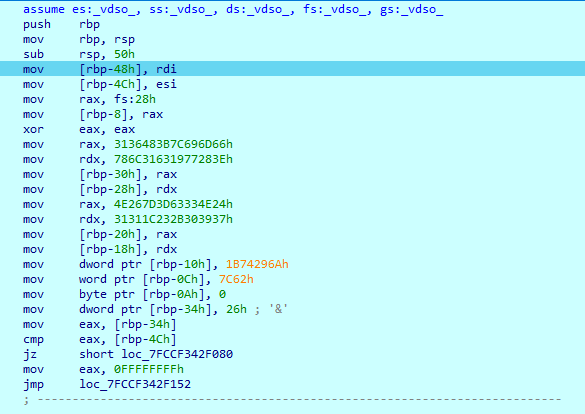Offshift x and or Write Up
Details:
Points: 500
Jeopardy style CTF
Category: Reversing
Write up:
The first thing I did once downloading the file was run the file and then check to see what type of file it was:
./x-and-or
Enter the flag: file x-and-or
x-and-or: ELF 64-bit LSB shared object, x86-64, version 1 (SYSV), dynamically linked, interpreter /lib64/ld-linux-x86-64.so.2, BuildID[sha1]=d75c2db8d7b1c77fd65762741f73b19aba4f2815, for GNU/Linux 3.2.0, not strippedSeeing as this was an ELF 64 bit file I opened the file in IDA and navigated to the pseudocode for the main function:
int __cdecl main(int argc, const char **argv, const char **envp)
{
char s[8]; // [rsp+Ch] [rbp-114h] BYREF
unsigned __int64 v5; // [rsp+118h] [rbp-8h]
v5 = __readfsqword('(');
printf("Enter the flag: ");
fgets(&s[4], 256, _bss_start);
s[strcspn(&s[4], "\r\n") + 4] = 0;
*(_DWORD *)s = strnlen(&s[4], '\x01\0');
if ( (unsigned int)code(&s[4], *(unsigned int *)s) )
puts("That is not the flag.");
else
puts("That is the flag!!!!");
return 0;
}The main function prints out "Enter the flag:" and then reads in what the user writes. Since this file links a .so file I needed to debug through in order to see the rest of the code so I set up the remote linux debugger and set a breakpoint on the if statement.
Once prompted for the flag I simply put in flag{, this way I would know the length and it would match the flag format. Once the debugger hit the if statement I stepped into the called function and got the following assembly:
Looking through the values I noticed that rdi contained the string I inputted (flag{) and esi contained the length of the string (5).
xor eax, eax simply sets eax to 0 since anything xor'ed with itself it 0.
The assembly then goes through and puts a string into rbp. After stepping through up until the cmp instruction I went to rbp-30h and saw:
I then extracted this under the assumption that this was the encrypted password.
enc = [0x66, 0x6D, 0x69, 0x7C, 0x3B, 0x48, 0x36, 0x31, 0x3E, 0x28, 0x77, 0x19, 0x63, 0x31, 0x6C, 0x78, 0x24, 0x4E, 0x33, 0x63, 0x3D, 0x7D, 0x26, 0x4E, 0x37, 0x39, 0x30, 0x2B, 0x23, 0x1C, 0x31, 0x31, 0x6A, 0x29, 0x74, 0x1B, 0x62, 0x7C]I then went back to the assembly. The cmp compared eax to [rbp-4Ch]. After some looking I noticed that [rbp-4Ch] contained 5 (string length) while eax contained 26h, meaning the flag should be 38 characters long. This reaffirmed my suspicions that enc was the encrypted password as end was 38 characters long.
I then set eax to be 5 so I could continue debugging and jumped through a few functions till I reached:
loc_7F6C28CE808C: ; CODE XREF: debug003:00007F6C28CE8147↓j
debug003:00007F6C28CE808C mov eax, [rbp-38h]
debug003:00007F6C28CE808F cdqe
debug003:00007F6C28CE8091 movzx eax, byte ptr [rbp+rax-30h]
debug003:00007F6C28CE8096 movsx edi, al
debug003:00007F6C28CE8099 mov edx, [rbp-38h]
debug003:00007F6C28CE809C movsxd rax, edx
debug003:00007F6C28CE809F imul rax, 2AAAAAABh
debug003:00007F6C28CE80A6 shr rax, 20h
debug003:00007F6C28CE80AA mov esi, edx
debug003:00007F6C28CE80AC sar esi, 1Fh
debug003:00007F6C28CE80AF mov ecx, eax
debug003:00007F6C28CE80B1 sub ecx, esi
debug003:00007F6C28CE80B3 mov eax, ecx
debug003:00007F6C28CE80B5 add eax, eax
debug003:00007F6C28CE80B7 add eax, ecx
debug003:00007F6C28CE80B9 add eax, eax
debug003:00007F6C28CE80BB mov ecx, edx
debug003:00007F6C28CE80BD sub ecx, eax
debug003:00007F6C28CE80BF mov esi, [rbp-38h]
debug003:00007F6C28CE80C2 movsxd rax, esi
debug003:00007F6C28CE80C5 imul rax, 2AAAAAABh
debug003:00007F6C28CE80CC shr rax, 20h
debug003:00007F6C28CE80D0 mov r8d, esi
debug003:00007F6C28CE80D3 sar r8d, 1Fh
debug003:00007F6C28CE80D7 mov edx, eax
debug003:00007F6C28CE80D9 sub edx, r8d
debug003:00007F6C28CE80DC mov eax, edx
debug003:00007F6C28CE80DE add eax, eax
debug003:00007F6C28CE80E0 add eax, edx
debug003:00007F6C28CE80E2 add eax, eax
debug003:00007F6C28CE80E4 sub esi, eax
debug003:00007F6C28CE80E6 mov edx, esi
debug003:00007F6C28CE80E8 mov esi, ecx
debug003:00007F6C28CE80EA imul esi, edx
debug003:00007F6C28CE80ED mov ecx, [rbp-38h]
debug003:00007F6C28CE80F0 movsxd rax, ecx
debug003:00007F6C28CE80F3 imul rax, 2AAAAAABh
debug003:00007F6C28CE80FA shr rax, 20h
debug003:00007F6C28CE80FE mov r8d, ecx
debug003:00007F6C28CE8101 sar r8d, 1Fh
debug003:00007F6C28CE8105 mov edx, eax
debug003:00007F6C28CE8107 sub edx, r8d
debug003:00007F6C28CE810A mov eax, edx
debug003:00007F6C28CE810C add eax, eax
debug003:00007F6C28CE810E add eax, edx
debug003:00007F6C28CE8110 add eax, eax
debug003:00007F6C28CE8112 sub ecx, eax
debug003:00007F6C28CE8114 mov edx, ecx
debug003:00007F6C28CE8116 mov eax, esi
debug003:00007F6C28CE8118 imul eax, edx
debug003:00007F6C28CE811B xor edi, eax
debug003:00007F6C28CE811D mov edx, edi
debug003:00007F6C28CE811F mov eax, [rbp-38h]
debug003:00007F6C28CE8122 movsxd rcx, eax
debug003:00007F6C28CE8125 mov rax, [rbp-48h]
debug003:00007F6C28CE8129 add rax, rcx
debug003:00007F6C28CE812C movzx eax, byte ptr [rax]
debug003:00007F6C28CE812F movsx eax, al
debug003:00007F6C28CE8132 cmp edx, eax
debug003:00007F6C28CE8134 jz short loc_7F6C28CE813D
debug003:00007F6C28CE8136 mov eax, 0FFFFFFFFh
debug003:00007F6C28CE813B jmp short loc_7F6C28CE8152
debug003:00007F6C28CE813D ; ---------------------------------------------------------------------------
debug003:00007F6C28CE813D
debug003:00007F6C28CE813D loc_7F6C28CE813D: ; CODE XREF: debug003:00007F6C28CE8134↑j
debug003:00007F6C28CE813D add dword ptr [rbp-38h], 1
debug003:00007F6C28CE8141
debug003:00007F6C28CE8141 loc_7F6C28CE8141: ; CODE XREF: debug003:00007F6C28CE8087↑j
debug003:00007F6C28CE8141 mov eax, [rbp-38h]
debug003:00007F6C28CE8144 cmp eax, [rbp-34h]
debug003:00007F6C28CE8147 jl loc_7F6C28CE808C
debug003:00007F6C28CE814D mov eax, 0This loops back around for the length of the input so I put a breakpoint on the xor line and checked the values of edi and eax. edi ended up being each char from my input string while eax changed each time:
Run 1: 0
Run 2: 1
Run 3 : 8
Run 4: 1B (27)
Run 5: 40 (64)
Run 6: 7D (125)
From this I get that the key is either 0, 1, 8, 27, 64, 125 or that there is one key value for each value in the password. I chose to try using just those values and wrote the following python script:
# encrypted password value
enc = [0x66, 0x6D, 0x69, 0x7C, 0x3B, 0x48, 0x36, 0x31, 0x3E, 0x28, 0x77, 0x19, 0x63, 0x31, 0x6C, 0x78, 0x24, 0x4E, 0x33, 0x63, 0x3D, 0x7D, 0x26, 0x4E, 0x37, 0x39, 0x30, 0x2B, 0x23, 0x1C, 0x31, 0x31, 0x6A, 0x29, 0x74, 0x1B, 0x62, 0x7C]
# key array
key = [0, 1, 8, 27, 64, 125]
# flag
flag = ""
# loops through all values in the encrypted password
for i in range(len(enc)):
# decrypts the current char in encrypted with the corresponding key value
flag += chr(enc[i]^key[i%len(key)])
# prints out value
print(flag)This printed out the following key which was accepted by the challenge:
flag{560637dc0dcd33b5ff37880ca10b24fb}
